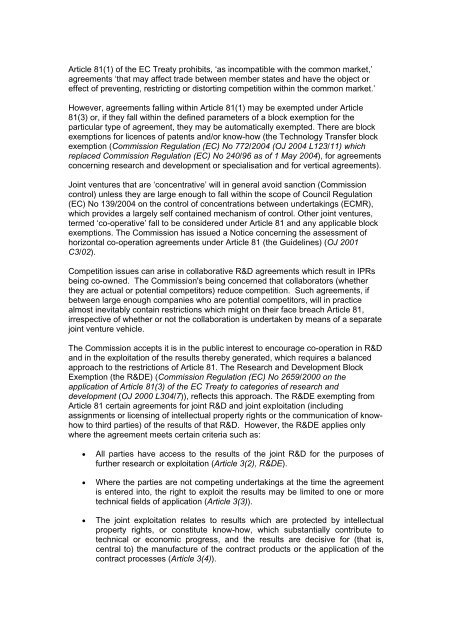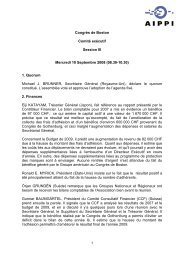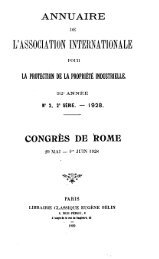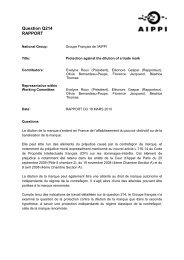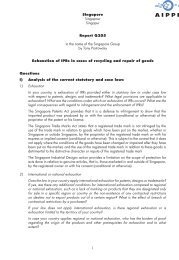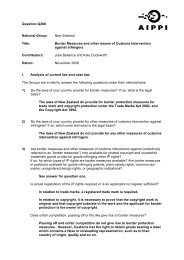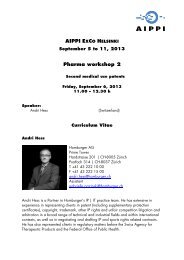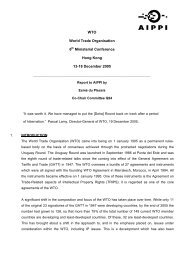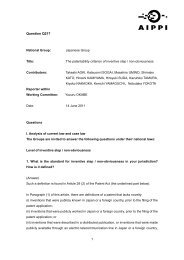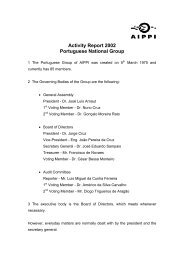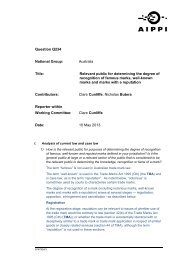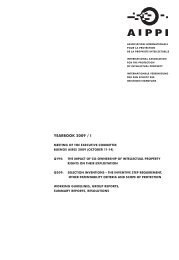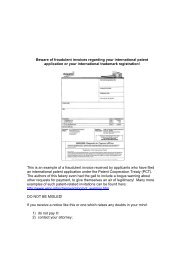Question Q194 National Group: United Kingdom Title: The ... - AIPPI
Question Q194 National Group: United Kingdom Title: The ... - AIPPI
Question Q194 National Group: United Kingdom Title: The ... - AIPPI
Create successful ePaper yourself
Turn your PDF publications into a flip-book with our unique Google optimized e-Paper software.
Article 81(1) of the EC Treaty prohibits, ‘as incompatible with the common market,’<br />
agreements ‘that may affect trade between member states and have the object or<br />
effect of preventing, restricting or distorting competition within the common market.’<br />
However, agreements falling within Article 81(1) may be exempted under Article<br />
81(3) or, if they fall within the defined parameters of a block exemption for the<br />
particular type of agreement, they may be automatically exempted. <strong>The</strong>re are block<br />
exemptions for licences of patents and/or know-how (the Technology Transfer block<br />
exemption (Commission Regulation (EC) No 772/2004 (OJ 2004 L123/11) which<br />
replaced Commission Regulation (EC) No 240/96 as of 1 May 2004), for agreements<br />
concerning research and development or specialisation and for vertical agreements).<br />
Joint ventures that are ‘concentrative’ will in general avoid sanction (Commission<br />
control) unless they are large enough to fall within the scope of Council Regulation<br />
(EC) No 139/2004 on the control of concentrations between undertakings (ECMR),<br />
which provides a largely self contained mechanism of control. Other joint ventures,<br />
termed ‘co-operative’ fall to be considered under Article 81 and any applicable block<br />
exemptions. <strong>The</strong> Commission has issued a Notice concerning the assessment of<br />
horizontal co-operation agreements under Article 81 (the Guidelines) (OJ 2001<br />
C3/02).<br />
Competition issues can arise in collaborative R&D agreements which result in IPRs<br />
being co-owned. <strong>The</strong> Commission's being concerned that collaborators (whether<br />
they are actual or potential competitors) reduce competition. Such agreements, if<br />
between large enough companies who are potential competitors, will in practice<br />
almost inevitably contain restrictions which might on their face breach Article 81,<br />
irrespective of whether or not the collaboration is undertaken by means of a separate<br />
joint venture vehicle.<br />
<strong>The</strong> Commission accepts it is in the public interest to encourage co-operation in R&D<br />
and in the exploitation of the results thereby generated, which requires a balanced<br />
approach to the restrictions of Article 81. <strong>The</strong> Research and Development Block<br />
Exemption (the R&DE) (Commission Regulation (EC) No 2659/2000 on the<br />
application of Article 81(3) of the EC Treaty to categories of research and<br />
development (OJ 2000 L304/7)), reflects this approach. <strong>The</strong> R&DE exempting from<br />
Article 81 certain agreements for joint R&D and joint exploitation (including<br />
assignments or licensing of intellectual property rights or the communication of knowhow<br />
to third parties) of the results of that R&D. However, the R&DE applies only<br />
where the agreement meets certain criteria such as:<br />
• All parties have access to the results of the joint R&D for the purposes of<br />
further research or exploitation (Article 3(2), R&DE).<br />
• Where the parties are not competing undertakings at the time the agreement<br />
is entered into, the right to exploit the results may be limited to one or more<br />
technical fields of application (Article 3(3)).<br />
• <strong>The</strong> joint exploitation relates to results which are protected by intellectual<br />
property rights, or constitute know-how, which substantially contribute to<br />
technical or economic progress, and the results are decisive for (that is,<br />
central to) the manufacture of the contract products or the application of the<br />
contract processes (Article 3(4)).


